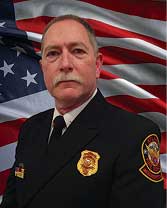Editor’s Opinion | By David Rhodes

The fire service culture war is in full effect. A quick scroll through social media leaves you with some very vanilla official fire department post about a promotion or a community service event. Counter to that are individuals and groups who have taken on the identities of cartels, the mafia, lots of skulls and tough-looking images, and plays on patriotic slogans from long ago, all with hopes and dreams of changing the world—or at least the fire service.
With the unlimited and mostly unrestricted communication tools we have, it is easy for people to communicate their ideas, methods, techniques, and opinions. Those who agree with them find instant confirmation and freely accept like-minded association. Tribal swag springs up because of a following, mostly in the form of stickers, hats, and T-shirts. These radicals (by some departments’ interpretation) are on a mission of change. In some instances, the leaders of these culture clubs often struggle to get the change they want within their departments. Creating a following outside of the organization is therapeutic and self-validating that the struggle is real and we are not alone!
I personally love the camaraderie, innovation, and learning that take place within the reach of these groups. We all love our identity swag as we fly our colors to let everyone know who we are or who we are affiliated with. But the question lingers as to whether or not we are changing the world, which is the intention.
The advent of rapid intervention teams was a bottom-up initiative born as a result of several line-of-duty deaths. Everyone was experiencing staffing shortages and budget cuts, but tactics had not changed. Mike Lombardo was one of those early culture warriors in creating some of the first firefighter rescue teams deemed FAST. The concept became popular with the rank-and-file, and several of us traveled the country teaching these firefighter rescue techniques in the late 1980s and early 1990s. We wanted to change the world but, despite our efforts, we had very small pockets of success based on our limited ability to be hosted by some like-minded training chief or local union group. While I believe we did make a difference in the skill level of hundreds or maybe even thousands of individual firefighters, we were playing checkers instead of chess.
It wasn’t until Chief Alan Brunacini led the development of NFPA 1500, along with OSHA adding the two-in/two-out language for any IDLH environment into the standard and code, that the fire department leaders took note. Two in/two out became law. We all know the good, the bad, and the ugly looking back, but at the time it forced leadership to adopt rapid intervention teams and training. Bruno was playing chess! Standard operation procedures were born, as were rapid intervention teams, rapid intervention crews, and initial rapid intervention crews, along with standard training curriculums, JPRs, task books, and skills assessment sheets. We quickly went from a handful of culture warriors reaching a small percentage of the fire service, the FDIC H.O.T. “Saving Our Own,” taught by Rick Lasky and John Salka, to 50 students a year, to something that was a standard in every basic firefighter and recruit school in the nation.
To effect a real change in culture, it takes more than sensationalism and popularity within like-minded people. Hell, you didn’t need to convince them, anyway. A revolution is needed in many areas within the fire service, but it will never be successful as a skirmish. JPRs need updating, implementing new research and tactics. There are better materials out there to make our gear better and safer. There are better ways to design and lay out apparatus for functionality. We have data that says we can provide trapped victims with a 70% chance of survival if we remove them within four minutes of our arrival, but we continue to try and remove all risks before we go get them. Officially, we are only tracking how many people die in fires and not how many the fire departments save. It’s revolutionaries who are independently tracking the rescues! The revolutionary bottom-up innovation will get a little attention, and although we will have a good time along the way trading our stickers, it will mostly be dismissed by those in the most powerful positions who are making the decisions and leading our organizations. In some cases, it will probably tick them off, and the door will be shut for the concepts, the ideas, and the change to ever grow legs.
A true revolution must be strategic. We must play chess, not checkers. The revolutionaries must learn the game, infiltrate, and play the established game to have serious impact and influence. We need you revolution-seeking firefighters to swarm the NFPA committees; we need you on local and regional committees that establish policy; and, most importantly, we need you to get promoted so you can have greater influence within your own organizations.
We need to also identify someone who can be the new Bruno, someone who has an ear to the ground listening to the revolutionaries but is well accepted within the current establishments and can help create evolution. If you are out there, please grab the bull by the horns and let’s go! In 1968, the great philosophers known as The Beatles said it best:
You say you got a real solution
Well, you know
We’d all love to see the plan
You ask me for a contribution
Well, you know
We’re all doing what we can.


